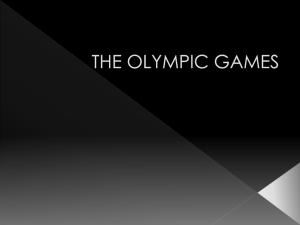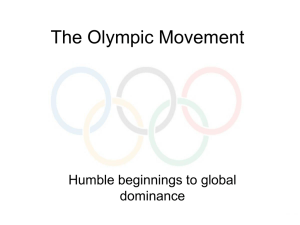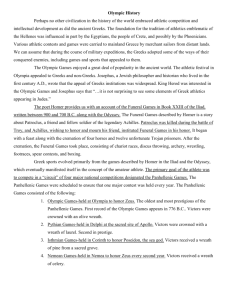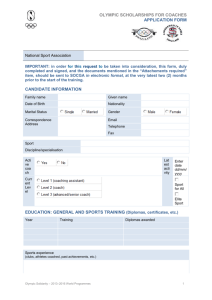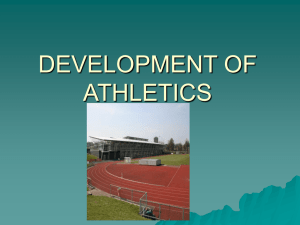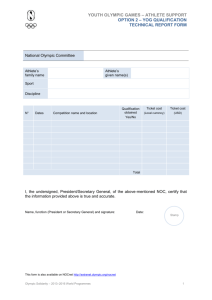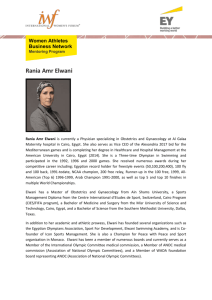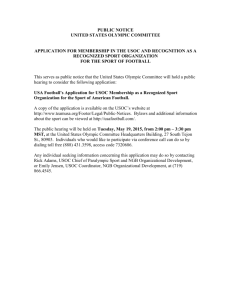KinSi 2-06.indd - Kinesiologia Slovenica
advertisement
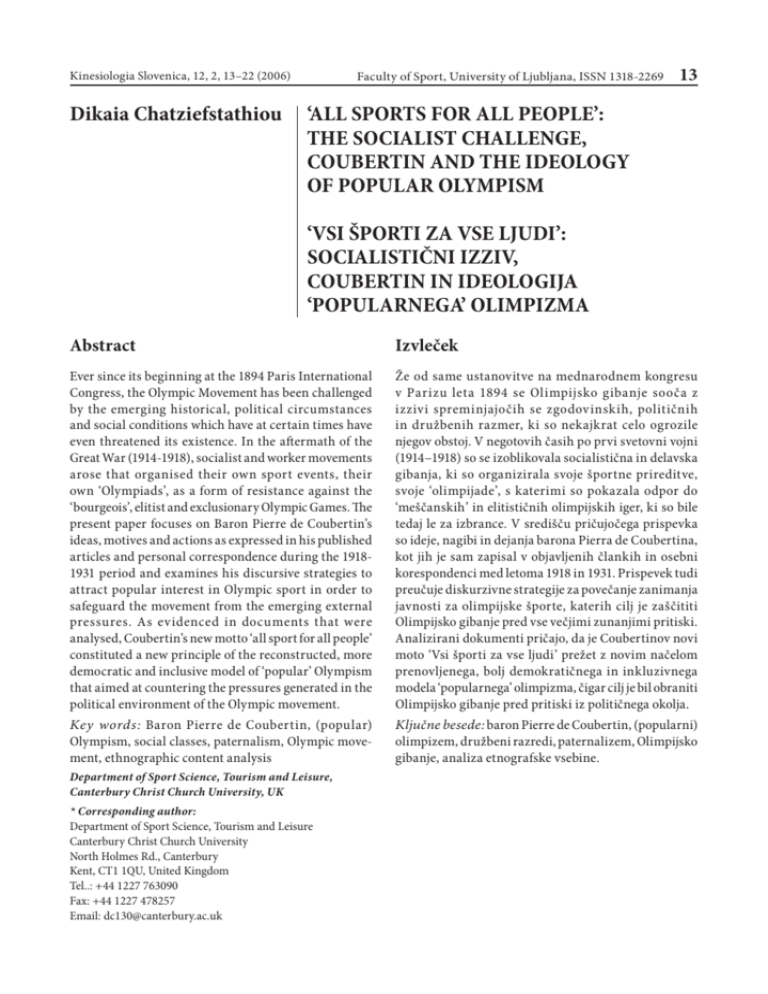
Kinesiologia Slovenica, 12, 2, 13–22 (2006) Dikaia Chatziefstathiou Faculty of Sport, University of Ljubljana, ISSN 1318-2269 13 ‘ALL SPORTS FOR ALL PEOPLE’: THE SOCIALIST CHALLENGE, COUBERTIN AND THE IDEOLOGY OF POPULAR OLYMPISM ‘VSI ŠPORTI ZA VSE LJUDI’: SOCIALISTIČNI IZZIV, COUBERTIN IN IDEOLOGIJA ‘POPULARNEGA’ OLIMPIZMA Abstract Izvleček Ever since its beginning at the 1894 Paris International Congress, the Olympic Movement has been challenged by the emerging historical, political circumstances and social conditions which have at certain times have even threatened its existence. In the aftermath of the Great War (1914-1918), socialist and worker movements arose that organised their own sport events, their own ‘Olympiads’, as a form of resistance against the ‘bourgeois’, elitist and exclusionary Olympic Games. The present paper focuses on Baron Pierre de Coubertin’s ideas, motives and actions as expressed in his published articles and personal correspondence during the 19181931 period and examines his discursive strategies to attract popular interest in Olympic sport in order to safeguard the movement from the emerging external pressures. As evidenced in documents that were analysed, Coubertin’s new motto ‘all sport for all people’ constituted a new principle of the reconstructed, more democratic and inclusive model of ‘popular’ Olympism that aimed at countering the pressures generated in the political environment of the Olympic movement. Že od same ustanovitve na mednarodnem kongresu v Parizu leta 1894 se Olimpijsko gibanje sooča z izzivi spreminjajočih se zgodovinskih, političnih in družbenih razmer, ki so nekajkrat celo ogrozile njegov obstoj. V negotovih časih po prvi svetovni vojni (1914–1918) so se izoblikovala socialistična in delavska gibanja, ki so organizirala svoje športne prireditve, svoje ‘olimpijade’, s katerimi so pokazala odpor do ‘meščanskih’ in elitističnih olimpijskih iger, ki so bile tedaj le za izbrance. V središču pričujočega prispevka so ideje, nagibi in dejanja barona Pierra de Coubertina, kot jih je sam zapisal v objavljenih člankih in osebni korespondenci med letoma 1918 in 1931. Prispevek tudi preučuje diskurzivne strategije za povečanje zanimanja javnosti za olimpijske športe, katerih cilj je zaščititi Olimpijsko gibanje pred vse večjimi zunanjimi pritiski. Analizirani dokumenti pričajo, da je Coubertinov novi moto ‘Vsi športi za vse ljudi’ prežet z novim načelom prenovljenega, bolj demokratičnega in inkluzivnega modela ‘popularnega’ olimpizma, čigar cilj je bil obraniti Olimpijsko gibanje pred pritiski iz političnega okolja. Key words: Baron Pierre de Coubertin, (popular) Olympism, social classes, paternalism, Olympic movement, ethnographic content analysis Ključne besede: baron Pierre de Coubertin, (popularni) olimpizem, družbeni razredi, paternalizem, Olimpijsko gibanje, analiza etnografske vsebine. Department of Sport Science, Tourism and Leisure, Canterbury Christ Church University, UK * Corresponding author: Department of Sport Science, Tourism and Leisure Canterbury Christ Church University North Holmes Rd., Canterbury Kent, CT1 1QU, United Kingdom Tel..: +44 1227 763090 Fax: +44 1227 478257 Email: dc130@canterbury.ac.uk 14 The socialist challenge, Coubertin and the ideology of popular Olympism Kinesiologia Slovenica, 12, 2, 13–22 (2006) INTRODUCTION By the summer of 1914, many people were expecting the Olympic Games of the Sixth Olympiad in Berlin with enthusiasm, but economic and political conflicts, nationalism and many crises eventually led to the outbreak of the Great War (1914-1918) (Guttmann, 1992). As part of the political consequences of the war, the old empires collapsed and new states were created, mostly in Eastern Europe. Czar Nicolas II of Russia fell in 1917 (Russian October 1917 Revolution), and Kaisar Wilhem II of Germany and the Emperor Charles of Austria-Hungary left their thrones in 1918. The Ottoman Empire was divided and placed under the control of France and Britain (Culpin, 2000). Economically, the war brought an ‘economic depression’ to Europe in the late 1920s and 1930s, increasing mass unemployment and poverty. The distinctions between the social classes were diminishing, as the upper class and the elites eventually lost their power and privileges. The ‘democratic’ countries weakened and extremist political parties emerged, promising to improve the current bad state of the economy. In Germany, the National Socialist (Nazi) Party was strengthened, while in the UK both the Communist Party and the British Union of Fascists gained popularity (Culpin, 2000). In this heavy atmosphere of global political and economic disorder, socialist and communist sport movements emerged and staged their independent sport events, challenging the authority of the IOC and pressurising for some reform and change. The present paper examines the mechanisms that the founder of the Olympic movement Baron Pierre de Coubertin developed as part of his discursive strategies to attract popular interest in Olympic sport and safeguard the movement from the emerging external pressures. METHOD In order to identify and evaluate the nature of Coubertin’s thinking and his tactics in relation to this strategy, the speeches, articles and correspondence of Coubertin relating to these issues were selected and subjected to analysis (n = 201). The approach adopted for analysing these data was that of Ethnographic Content Analysis (ECA) (Altheide, 1996). Coubertin is selected for analysis since he was the founder and President of the IOC, and is generally regarded as the most influential figure in the early period of the Olympic movement. Especially during the inter-war years, Coubertin became a key actor in the Olympic organisation by facilitating or constraining different processes with his actions, thus leaving his imprint both on the ideology of Olympism and the policy of the IOC. His writings provide evidence of his worldview (values, norms, perspectives) in relation to the ideology of Olympism, as well as providing one man’s testimony as to the rationales underpinning action by the IOC and its members. Within this sample of items, a sub-set of 10 texts authored in the 1918-1931 period dealing in significant detail with the processes of democratising and popularising Olympism after the emergence of socialist and communist sport movements, thus represent the main sources for this paper. All documents employed in this analysis were available in English (some having been translated from French) and were subjected to ECA employing NUD*IST software for coding purposes and for ordering the themes which emerged in the data. ECA is a variation of qualitative content analysis and uses a categorisation process for investigating underlying themes. It implies an understanding of the views of the subject (in this case of Coubertin) from the subject’s own perspective and via their linguistic constructions. Kinesiologia Slovenica, 12, 2, 13–22 (2006) The socialist challenge, Coubertin and the ideology of popular Olympism 15 The aim of ECA is ‘to be systematic and analytic but not rigid. Categories and variables initially guide the study, including an orientation to constant discovery and constant comparison of relevant situation, settings, styles, images, meanings, and nuances’ (Altheide, 1996, p. 16). ECA is thus a particularly useful approach for the type of reconstruction of Coubertin’s world view which we are undertaking, since its processes are largely inductive and ‘discovery’ oriented. RESULTS The socialist challenge and the Olympic Movement In various European countries, particularly Germany and the states of the Austro-Hungarian Empire, strong socialist, social democratic and workers’ movements established large sports organisations on a national basis (Riordan, 1999; Roche, 2000). In the period after the war, European socialists allied to establish an international socialist sport organisation (1920), which was renamed the ‘Socialist Workers Sport International’ (SWSI). Its emphasis was on mass participation and non-competitive sport, calling for a link between sport and wider political and cultural activities (Roche, 2000). In the inter-war period, socialist movements were opposed to the elitism of the Olympic Movement, which tended to make sport exclusive and inaccessible to working-class athletes. Therefore, sports movements of the political Left staged sports festivals as an alternative to the bourgeois Olympics. The SWSI’s political profile was reformist and not revolutionary, thus it banned its members from participating in the Soviet Spartakiads, a series of large-scale workers’ Olympic-type events organised by the revolutionary Red Sport International (RSI) organisation. The main events the SWSI organised were the Workers Olympics in Frankfurt in 1925, in Vienna in 1931, and in Antwerp in 1937. As a counter to both the socialist games of the SWSI and to the bourgeois Olympics, the Soviet communist sports movement staged the Worker Spartakiads. The First Worker Spartakiad was launched on 12 August 1928 by a parade of 30,000 men and women who marched through Moscow’s Red Square to the Dinamo Stadium. Despite the boycott by both socialist and bourgeois sport associations, 600 worker athletes from 14 countries were said to have taken part (Riordan, 1999). Due to the increasing popularity of the socialist movements, capitalist governments mobilised and acted against them. When communist workers attempted to stage a Second Spartakiad in Berlin in 1932, all Soviet and some other athletes were refused visas to enter Germany and then, when they finally managed to reach Berlin, the games were banned (Riordan, 1999). The last Spartakiad Games, prior to the Second World War, were organised in Moscow in 1932, in opposition to the Olympic Games held in Los Angeles in the same year (Roche, 2000). In 1917, the USSR organised the Central Asian Games in Tashkent in which 3,000 athletes took part, a significantly larger number than that of the athletes participating at the 1920 Olympics in Belgium (Riordan, 1999; Roche, 2000). The importance of this event lay in the fact that at these games for the first time some of the Russian ex-colonies were summoned together, despite their language, religious and cultural differences. Three years later, in 1920, the USSR celebrated the third anniversary of the 1917 ‘October Revolution’ with a mass demonstration of the Bolshevik storming of the Winter Palace involving 18,000 athletes. This event was termed 16 The socialist challenge, Coubertin and the ideology of popular Olympism Kinesiologia Slovenica, 12, 2, 13–22 (2006) a ‘pre-Olympics’ as a reference to the 1920 Olympics to which the USSR had not been invited to take part. In 1925 and 1928 the Soviets organised the ‘Spartakiad Games’, a very successful event that combined sport competitions and cultural manifestations. They have been described as a ‘ritualised Marxist demonstration against the hypocrisy of the bourgeois Olympics with their apparent discrimination against working class athletes’ (Riordan, 1999). In 1932, the last Spartakiad Games prior to World War II were held in Moscow. It has been suggested that those Games were held in this year as part of the ideological opposition to the 1932 Olympic Games in Los Angeles (Roche, 2000). Coubertin often asserts in his writings that the changes to the social order after the end of the war did not have a major impact on the structure of the Olympic Movement. Coubertain (1928, p. 604) stated: ‘Olympism passed through the Great War without even a shake. I am confident it would not prove less solid in case of social troubles. At any rate, the corporative tendencies of our times are by no means anti-Olympic. I noted with pleasure the workmen’s acceptation of Olympic principles and spirit.’ Although he acknowledges that the ‘Workers’ Olympiads’ had achieved remarkable success, he emphasises their weaknesses centred upon the internal conflicts between the socialist and communist organisations which led to changing the name of their events. ‘It was in the early days of their revival that they [i.e. the Olympic Games] ran the greatest risks; at present, the sap flows too strongly for it ever to dry up. The 1914-1918 war did not shake them: the social revolution did not affect them either. It is interesting to note, moreover, that alongside the ‘capitalist’ organisation there is already a ‘proletarian’ organisation. ‘Workers’ Olympiads’ have been held at regular intervals and not without success. At the time of writing, a gigantic stadium is, I am told, being built in Moscow, where the next are to be held. They are even said to be going to take advantage of the occasion to change the name of this athletic meeting, which-if this were the case-would be infantile and only serve to emphasise an only too frequent failing of revolutionaries the world over: when so many institutions need radical renovation, they limit themselves merely to changing the name: what are needed are deeds not words.’ (Coubertin, 1997, p. 747-748). The division between the socialist and communist organisations over the leadership and aims of the worker sport movement emerged after the formation of the communist International Association of Red Sports and Gymnastics (better known as Red Sport International – RSI) in Moscow in 1921, as a branch of the Communist International or Comintern. Until then, the Lucerne Sport International (LSI – a branch of the Bureau of the Socialist International) had led the worker movement, trying to develop it as a strong independent movement within capitalist society. Thus, the socialists were not trying to turn their sport movement into an active revolutionary force. Under socialist leadership, three ‘Workers’ Olympics’ were held (Prague 1925, Frankfurt 1925, Antwerp 1937). Nonetheless, the communists wished to organise international sport as a political vehicle of the class struggle, considering that it was not sufficient merely to organise a worker movement within the capitalist order. So they organised the Soviet Spartakiads and banned all their members (RSI) from any activities and contacts with the LSI. Although the two worker sport movements came together again in 1936, Krüger (1999) argues that these internal conflicts of the worker movements, together with the over-politicisation of the worker sport and Kinesiologia Slovenica, 12, 2, 13–22 (2006) The socialist challenge, Coubertin and the ideology of popular Olympism 17 the under-representation of these events in the media, led to their falling popularity among the working classes. Nevertheless, even though Coubertin did not openly admit that such strong socialist and workers movements threatened the existence of the ‘bourgeois’ Games, his concerns were obvious. ‘A country is not truly sporting until the day when the greater part of its citizens feels personal need for sport […]. And it is for the adult overtaxed and exhausted by modern life that sport constitutes an essential counterbalance, an almost infallible means of recovery, a discipline that nothing can replace. Now what facilities do our organisations provide for his in this respect? […] What gymnasium - free or almost free - is open to him? […] That is the reason why I wish to see a revival in an extended and modernised form of the municipal gymnasium of antiquity. […] And let the ‘bourgeois’ look out for the establishment of which I am speaking could well be built one day at their expense by the proletariat, which is already organizing Workers’ Olympic Games in which the sporting spirit is superior to theirs’ (Coubertin, 1927, p. 235, emphasis added). The above quote is taken from an open letter to Frantz-Reichel, who was Coubertin’s close collaborator in France and had served as Secretary General of the 1924 Olympic Games. Coubertin in this letter warns Frantz-Reichel that, if sport were not to be democratised by establishing institutions such as the public gymnasium, the worker movement would undertake such a project, threatening the existence of the ‘bourgeois’ sport movement. A response to the socialist challenge: the emergence of ‘popular’ Olympism Such concerns also explain why Coubertin, in his speeches of that period, seemed very keen to promote the principle of social equality and advocates sport for all. ‘This new era demands such a change [i.e. federations to adopt a more “tolerant” policy in matters about class]. For a long time, the renewed interest in athleticism during the nineteenth century was merely an occasional pastime for rich and semi-idle youth. Our Committee has fought more than anyone to make it a habitual pleasure of the youth of the lower middle class. Now it must be made fully accessible to proletarian adolescents. All sports for all people; that is the new goal to which we must devote our energies, a goal that is not in the least impracticable. The recent war was won by the western powers thanks to a “sacred union”, based on the conviction that the two-fold stakes of the fight were the political freedom of States, and the social equality of individuals. If we were to forget the second goal after achieving the first, civilisation would run the risk of exploding like a boiler without a safety valve’ (Coubertin, 1919a, p. 739, emphasis added). The above message, with a few alterations, is also included in his Olympic memoirs. ‘It also implies recognition of the vital fact, strongly contested until quite recently, that sport is not a luxury pastime, an activity for the leisured few, nor merely a form of muscular compensation for brain work. For every man, woman and child, it offers an opportunity for self-improvement quite independent of profession or position in life. It is the apanage of all, equally and to the same degree, and nothing can replace it’ (Coubertin, 1997, p. 748). In a similar vein, he condemns the uniformity caused by industrialisation, one product of which is the working class itself, and emphasises Olympism’s social and democratic character. 18 The socialist challenge, Coubertin and the ideology of popular Olympism Kinesiologia Slovenica, 12, 2, 13–22 (2006) ‘Olympism refuses to accept the existence of a deluxe education reserved for the wealthy classes, no shred of which should be handed out to the working classes. It refuses to condense art into pills that everyone will take at set hours and to establish timetables of thought along the lines of railways schedules. Olympism is a destroyer of dividing walls. It calls for air and light for all. It advocates a broad-based athletic education accessible to all, trimmed with manly courage and the spirit of chivalry, blended with aesthetic and literary demonstrations, and serving as an engine for national life and as a basis for civic life. That is its ideal program. Now can it be achieved?’ (Coubertin, 1918a, p. 548) The Workers’ Olympiads were opposed to the exclusionary values of elitism, racism and sexism, which tended to make sport inaccessible to working-class athletes. The IOC Games were criticised for being the preserve of the sons of the rich and privileged through the rules of amateurism and the ‘aristocratic-cum-bourgeois-dominated national Olympic committees’, as well as the IOC itself (Krüger 1999, Roche 2000). Coubertin, in order to safeguard the severely scrutinised ‘bourgeois’ Olympic Movement, initiated a new, more democratic, popular and inclusive programme. ‘Now, nothing is accomplished when only limited numbers are involved. That may have been sufficient before, but not now. The masses must be touched. In truth, in the name of what can the masses be excluded from Olympism? By virtue of what aristocratic decrees does there exist some link between physical beauty and the muscular power of a young man, between his perseverance in training and his desire to win, on the one hand, and on the other hand, the list of his forefathers or the contents of his wallet? Such contradictions in terms, which are unfounded in law, lived on after the social organisation that created them. It is morally right that it was an autocratic gesture based on an outburst of barbarous militarism that dealt them the deathblow. [...] Faced with a new world that must be ordered according to principles thought to be utopian until now, and that can now be applied, humanity must find all the strength it can in the heritage of the past in order to build its future. Olympism is one of those strengths’ (Coubertin, 1919c, pp. 552-553). He also wished to introduce this ‘inclusive’ programme to education institutions, mainly universities, hoping that, if applied to all, the principles of sport would contribute to the maintenance of social peace, which had been shaky after the war. ‘But it is also useful to him [i.e. the university student] in carrying out the social task which will lie ahead of him in the new society […] All forms of sport for everyone; that is not doubt a formula which is going to be criticized as madly utopian. I do not care. I have weighed and examined it for a long time; I know it is accurate and possible. The years and the strength which remain to me will be employed to ensure its triumph; it will be my contribution to those social reforms whose principle was the basis of the pact of sacred union during this long war and whose achievement will have to be honest and swift if we do not want civilisation to blow up like a boiler without a valve, University students, messengers of knowledge and imagination, will constitute he most active battalions in this great task; let us say if you wish that they will have to be us aviators. Now I have said, and I repeat, that sport by reason of its potent physical and moral effects will be an inestimable instrument in their hands for the establishment of social peace. Kinesiologia Slovenica, 12, 2, 13–22 (2006) The socialist challenge, Coubertin and the ideology of popular Olympism 19 They must therefore know how to handle it with tact and how to derive the maximum effect from it. Popular Olympism is about to be born; let the students prepare to serve it’ (Coubertin, 1919b, pp. 172-173, emphasis added). As a response to the socialist challenge that the new social order and the worker movement had raised, Coubertin put forward the notion of ‘popular Olympism’. He emphasised the need for the existence of the Olympic Games as a product of popular culture that would enhance the sense of collectiveness among the individuals of modern society, increasing the chances of maintaining social peace and unity. ‘Let us look around us and see what are the general needs of the age (sic). It seems that the primary effort is towards a more just distribution and remuneration of labour, then towards a better delimitation between the area of public services and that of private initiative, whose frontiers are drawn in a frequently vague and sometimes absurd fashion, and lastly towards an education within the range of all and no longer the monopoly of a small number. But all these reforms risk remaining sterile unless we succeed in creating a centre for popular spectacles and enjoyments in which a simple, clear and tangible idea can draw together not only people of all ages and all professions, but of all opinions and all situations’ (Coubertin, 1918b, p. 220). His motto in the post-war era became ‘all sports for all people’ as part of an effort to establish more sports associations that would serve the interests of the general public. He also expressed the idea of establishing a ‘popular university’ for the education of all individuals, where members of the working class would be taught world history, science, philosophy, language and other topics (Coubertin, 1922). ‘I expect a great deal of the working class. It is possessed of splendid strengths, and seems to me to be capable of great things. Moreover are we not deluding ourselves a bit as far as that culture, of which we are so proud, is concerned? There is so much dross mixed in with the pure metal, so much incoherence, insipidness, hollow vanity, and thinly disguised pornography! Whatever the case may be, here is how the issue stands, as I see it. There is not (sic) way to link the working class suddenly with high culture, as the previous age understood it. The working class must prepare its own inventory of high culture, so that if the temple that contains the accumulated wealth of civilisation should be entrusted to its care in the future, that temple will be respected and maintained. From this viewpoint, a plan for labour universities was devised […] “What?” you may say, “you want to teach all that to manual labourers? What foolishness! They have neither the time nor the taste for such studies.” I know; I am familiar with this disdain and these people, when I planned to re-establish the Olympic Games, took me for a madman, too’ (Coubertin, 1922, pp. 208-209, emphasis added). Evidence of paternalism Although Coubertin acknowledges that the working class should not be undermined in its efforts to establish its own culture, his statements are punctuated by paternalist references. He suggests that the ‘high culture’, as has been so far understood by the bourgeois, cannot be wholly embraced by the working class. The rationale of such a claim is better understood in the following: 20 The socialist challenge, Coubertin and the ideology of popular Olympism Kinesiologia Slovenica, 12, 2, 13–22 (2006) ‘Now we come to the third factor that guarantees the stability of athletic sovereignty. I am referring to the conquest of the masses that athletic organisations, as they have existed so far, have been unable to reach. How could they have? We are dealing with the self-baptized, the proletariat, in the pejorative sense of a social have-not. The hour of proletarian revenge has sounded for; we must acknowledge nothing can be done from now on without it. It is the horde, and a horde overwhelms an elite that has not always remained worthy of its privileges. Yet the proletariat is not ready for its task at all. It has not been instructed. No one has ever bothered to show it all the riches housed in the intellectual temple, a temple that now depends, in part, on that same proletariat for its very preservation. Above all no one has done anything to dispel the bitterness - no, let us speak frankly, let us use the words that are fitting - to soothe the intense anger, the accumulated hatred that form the disturbing substrate of the new foundations now being laid’ (Coubertin, 1920, p. 225, emphasis added). Coubertin seems to accept, if not embrace, the new reality of greater rights and freedom for the proletariat. However, once again showing evidence of paternalism he emphasises that the proletariat is not capable of carrying out successfully its new tasks in society without the guidance of bourgeois groups. In a similar vein, he argued: ‘There was a confused sense that this war was not going to be like any other, and that, dominated by a new element – the unity of the world – this war was creating unexpected opportunities. Once it was over, accumulated rancour and cramped appetites would clash in a gigantic battle for the conquest of power. Merely pushing the working class back into its previous status was not an option. The only choices open to discussion were to join forces with it or to submit to it. Various opinions are in the process of being formed about these alternatives. Some, in light of the flaws in and the breakdown of society, its inability to reform itself, are attached to the idea of a new, more just society – and thereby a more Christian society. Others think that we have what it takes to rebuild, and that it is just a matter of time until that is apparent. But in the near future, whether the working class is in full control of power or merely involved in the exercise of that power, the issue of preparing that class is just as essential. Yet there is no such preparation. […] From this viewpoint, a plan of labour universities was devised’ (Coubertin, 1922, pp. 207-208, emphasis added). Thus the establishment of a popular university may be seen as an attempt by bourgeois interests – and by Coubertin in particular – to ‘instruct’ the proletariat by organising its education. It may be argued that, since the rising power of the proletariat could not be halted, initiatives such as the popular university could at least assist the bourgeois to maintain some kind of indirect control over the proletariat. Concluding remarks As a response to the socialist challenge that the new social order and the socialist and communist movements had raised, Coubertin promoted the notion of ‘popular Olympism’. Unquestionably, he made remarkable efforts to reform Olympism and transform it to a more democratic and popular philosophy, thus emphasising the necessity to embrace all people from all classes. He underlined the existence of the Olympic Games as a product of popular culture that would develop the sense of collectiveness among the individuals of modern society, Kinesiologia Slovenica, 12, 2, 13–22 (2006) The socialist challenge, Coubertin and the ideology of popular Olympism 21 increasing the chances of maintaining social peace and unity in the turbulent years that followed the end of the First World War. Throughout these years, the Olympic Movement has shown considerable resilience and flexibility to adapt to pressures generated in its political environment through changes in the ideology of Olympism. This provided evidence that the Olympic Movement could develop sensitivity in social matters and that it could be flexible when this was needed. However, evidence of paternalism also suggests that such changes may have been part of Coubertin’s discursive strategies to downplay any resistance and prolong the longevity of the movement rather than any substantial ideological transformation of the inherently aristocratic nature of the principles that underpinned it, particularly in the late nineteenth and early twentieth centuries. REFERENCES Altheide, D.L. (1996). Qualitative media analysis. Thousand Oaks: Sage. Coubertin, P. (1918a). Olympic letter III: Olympism and education. In N. Müller (ed.), Pierre de Coubertin 1863-1937 - Olympism: Selected Writings (pp. 547-548). Lausanne: International Olympic Committee. Coubertin, P. (1918b). Olympic Letter VI: Panem et Circenses. In N. Müller (ed.), Pierre de Coubertin 1863-1937 - Olympism: Selected Writings (p. 220). Lausanne: International Olympic Committee. Coubertin, P. (1919a). Letter to the members of the International Olympic Committee (January, 1919). In N. Müller (ed.), Pierre de Coubertin 1863-1937 - Olympism: Selected Writings (pp. 737-741). Lausanne: International Olympic Committee. Coubertin, P. (1919b). Olympic letter XI: The sporting spirit of students. In N. Müller (ed.), Pierre de Coubertin 1863-1937 - Olympism: Selected Writings (pp. 172-173). Lausanne: International Olympic Committee. Coubertin, P. (1919c). The Twenty-Fifth Anniversary of the Proclamation of the Olympic Games. In: N. Müller, (ed.), Pierre de Coubertin 1863-1937 - Olympism: Selected Writings. Lausanne: International Olympic Committee, pp. 551-553. Coubertin, P. (1920). Address delivered at Antwerp city hall in August, 1920: Sport is king. In N. Müller (ed.), Pierre de Coubertin 1863-1937 - Olympism: Selected Writings (pp. 222-226). Lausanne: International Olympic Committee. Coubertin, P. (1922). Between two battles: From Olympism to the popular university. In N. Müller (ed.), Pierre de Coubertin 1863-1937 - Olympism: Selected Writings (pp. 203-209). Lausanne: International Olympic Committee. Coubertin, P. (1927). The truth about sport: The ideas of Pierre De Coubertin. An open letter to FrantzReichel. In N. Müller (ed.), Pierre de Coubertin 1863-1937 - Olympism: Selected Writings (pp. 235-236). Lausanne: International Olympic Committee. Coubertin, P. (1928). Message to all athletes and participants meeting at Amsterdam for the ninth Olympiad. In N. Müller (ed.), Pierre de Coubertin 1863-1937 - Olympism: Selected Writings (pp. 603-604). Lausanne: International Olympic Committee. Coubertin, P. (1997). Legends. In N. Müller (Ed.), Pierre de Coubertin 1863-1937 - Olympism: Selected Writings (pp. 747-749). Lausanne: International Olympic Committee. Culpin, C. (2000). Making history: World history from 1914 to the present. London: Collins Educational. 22 The socialist challenge, Coubertin and the ideology of popular Olympism Kinesiologia Slovenica, 12, 2, 13–22 (2006) Guttmann, A. (1992). The Olympics: A history of the modern games. Urbana: University Of Illinois Press. Krüger, A. (1999). The unfinished symphony: A history of the Olympic games from Coubertin to Samaranch. In J. Riordan & A. Krüger (eds), The international politics of sport in the 20th century (pp. 3-27). London: Taylor and Francis. Riordan, J. (1999). The impact of communism on sport. In J. Riordan & A. Krüger (eds.), The international politics of sport in the 20th century (pp. 48-66). London: Taylor and Francis. Roche, M. (2000). Mega-events and modernity: Olympics, expos and the growth of global culture. London: Routledge.
